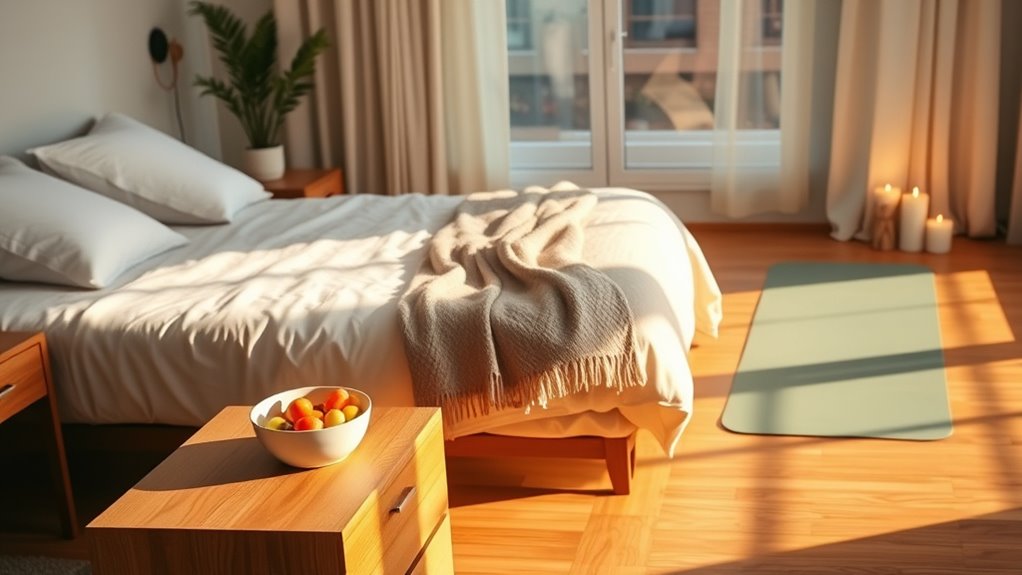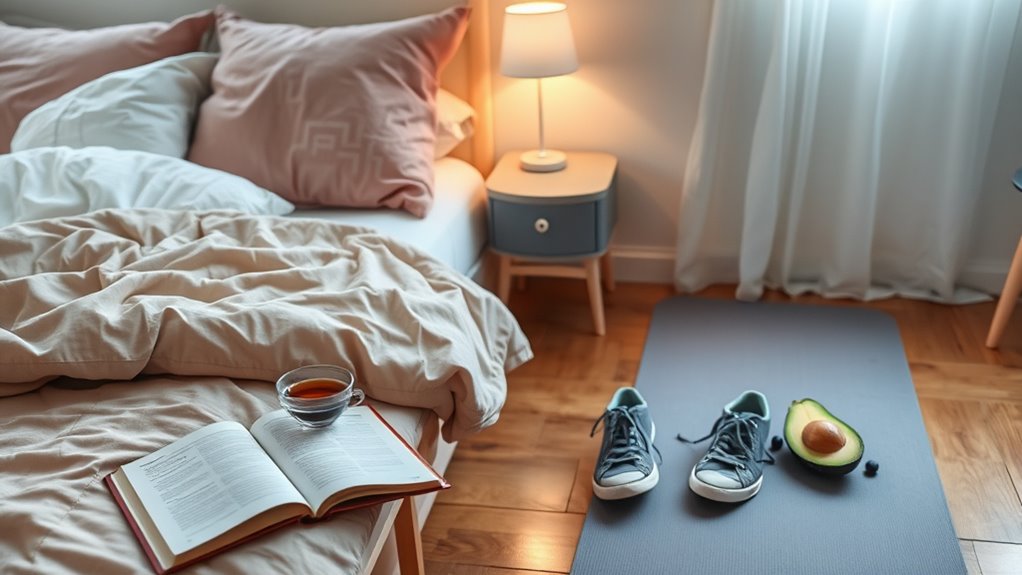To support healing with BPD, focus on establishing a consistent sleep schedule by sticking to regular bedtimes and creating a calming environment. Eat a balanced diet rich in vegetables, fruits, lean proteins, and whole grains while limiting sugar, caffeine, and processed foods. Incorporate gentle movement like walking or yoga daily to boost mood and reduce tension. Practicing relaxation techniques before bed and making small lifestyle changes can make a big difference—discover how these strategies work together for your stability and growth.
Key Takeaways
- Maintain consistent sleep schedules and create a calming bedtime routine to improve sleep quality and emotional stability.
- Follow a balanced diet rich in vegetables, fruits, lean proteins, and whole grains while limiting sugar and caffeine.
- Incorporate gentle movement like walking or yoga daily to reduce tension and boost mood.
- Use relaxation techniques such as deep breathing or meditation before bed to promote calmness and reduce anxiety.
- Make gradual lifestyle changes, focusing on small, consistent actions to support overall well-being and symptom management.

Living with borderline personality disorder (BPD) can considerably impact your daily life, but making intentional lifestyle choices can help manage symptoms and improve your overall well-being. One of the most effective ways to do this is by prioritizing sleep. When your sleep patterns are irregular or disrupted, your emotions can become more intense, and your ability to cope diminishes. Establish a consistent bedtime routine, aiming to go to bed and wake up at the same time each day. Avoid screens and caffeine before sleep, and create a calm, dark environment in your bedroom. Over time, these habits can help regulate your circadian rhythm, making it easier to fall asleep and wake up feeling refreshed. Good sleep isn’t just about quantity; quality matters too. If you struggle with insomnia or restless nights, consider relaxation techniques like deep breathing, meditation, or gentle stretches before bed. These practices can reduce anxiety and promote a sense of calm, which is essential for emotional stability. Incorporating digital literacy strategies to limit screen time before bed can further enhance sleep quality and overall mental health. Food choices also play a fundamental role in managing BPD symptoms. You might notice that certain foods affect your mood or energy levels. Aim for a balanced diet rich in vegetables, fruits, lean proteins, and whole grains. These foods provide essential nutrients that support brain health and stabilize blood sugar levels, preventing crashes that can trigger emotional upheaval. Avoid excessive sugar, processed foods, and caffeine, which can cause spikes and drops in energy and mood, making symptoms worse. Staying hydrated is equally important; dehydration can lead to irritability and difficulty concentrating. Planning your meals and snacks ahead of time can help you maintain steady blood sugar and avoid impulsive eating that might lead to regret or guilt. Listening to your body’s hunger cues and eating mindfully can also improve your relationship with food and reduce emotional eating episodes. Incorporating movement into your daily routine is another powerful tool for managing BPD. You don’t need intense workouts; even gentle activities like walking, yoga, or stretching can make a difference. Regular movement helps release tension, boost endorphins, and improve overall mood. It also provides a healthy outlet for emotions you might otherwise suppress or act out. Find activities you enjoy to make movement feel less like a chore and more like a self-care ritual. If you’re feeling overwhelmed, even a few minutes of deep breathing or light stretching can help ground you in the present moment. Consistency is key. Over time, physical activity can reduce symptoms of anxiety and depression, increase your resilience, and give you a greater sense of control over your emotional landscape. Remember, small, intentional steps toward healthier sleep, food, and movement habits can accumulate, making a meaningful difference in your journey with BPD.
Frequently Asked Questions
Can Modifying My Lifestyle Fully Cure BPD?
Modifying your lifestyle can considerably improve your symptoms and help manage BPD, but it’s unlikely to fully cure it. You’ll benefit from healthier sleep, balanced nutrition, and regular movement, which support emotional stability. However, BPD is a complex mental health condition that often requires therapy and sometimes medication. Combining lifestyle changes with professional treatment gives you the best chance to lead a balanced, fulfilling life.
How Do I Balance Medication and Lifestyle Changes?
You should work closely with your healthcare provider to balance medication and lifestyle changes effectively. Follow their advice on adjusting dosages and timing, and communicate any side effects or concerns. Incorporate healthy habits like regular sleep, balanced eating, and exercise to support your treatment. Remember, combining medication with lifestyle adjustments enhances your healing process, so stay consistent, stay in touch with your provider, and prioritize your well-being.
Are There Specific Foods That Help Manage BPD Symptoms?
You should focus on incorporating foods rich in omega-3 fatty acids, such as salmon and walnuts, which can support brain health and mood stability. Include complex carbs like whole grains and vegetables to maintain steady blood sugar levels. Avoid excessive caffeine and processed foods, as they may trigger mood swings. Staying hydrated and eating balanced meals regularly can also help manage your symptoms more effectively.
How Do I Stay Motivated for Lifestyle Changes Long-Term?
Did you know that 80% of people who set small, achievable goals stick with their habits longer? To stay motivated long-term, focus on celebrating your progress, no matter how small. Keep reminding yourself of your reasons for change, and make routines enjoyable. Find support from friends or communities, and remember that setbacks are normal. Consistency beats perfection—so keep moving forward, even if it’s just a little each day.
Can Sleep Hygiene Improve Emotional Regulation in BPD?
Yes, improving your sleep hygiene can substantially boost emotional regulation. When you prioritize consistent sleep routines, avoid screens before bed, and create a calming environment, your brain can process emotions more effectively. Better sleep reduces mood swings and stress, helping you manage intense feelings more easily. By making these small changes, you’ll support your emotional stability and overall mental health, making it easier to navigate daily challenges.
Conclusion
Taking care of your sleep, food, and movement can truly support your healing journey with BPD. Remember, studies show that around 50% of people with BPD also struggle with sleep issues, highlighting how essential lifestyle habits are. By prioritizing these areas, you’re empowering yourself to manage symptoms better and foster resilience. Small daily changes can make a big difference—so be gentle with yourself and stay committed to your wellbeing. You’re not alone in this journey.









